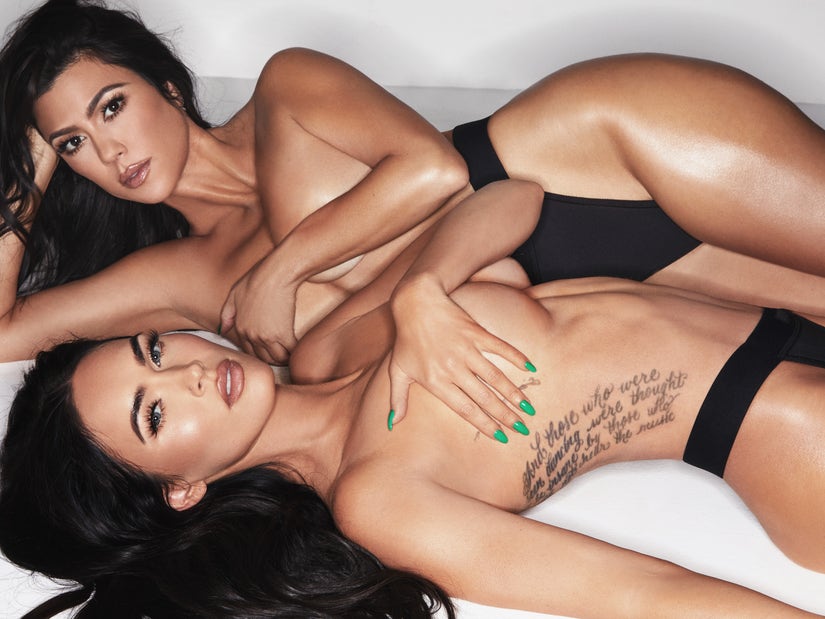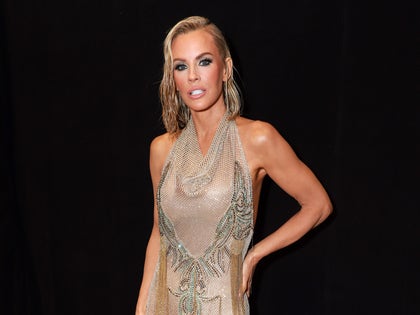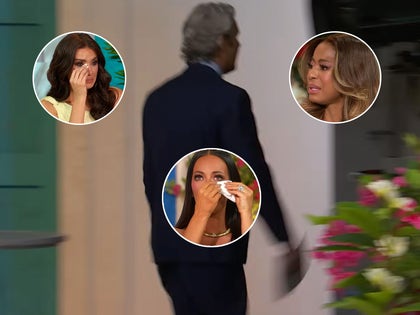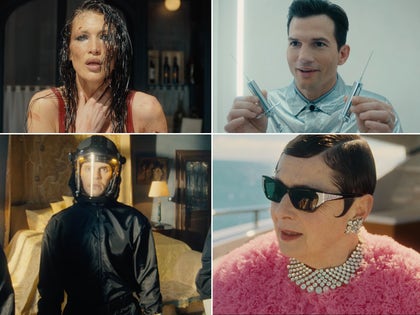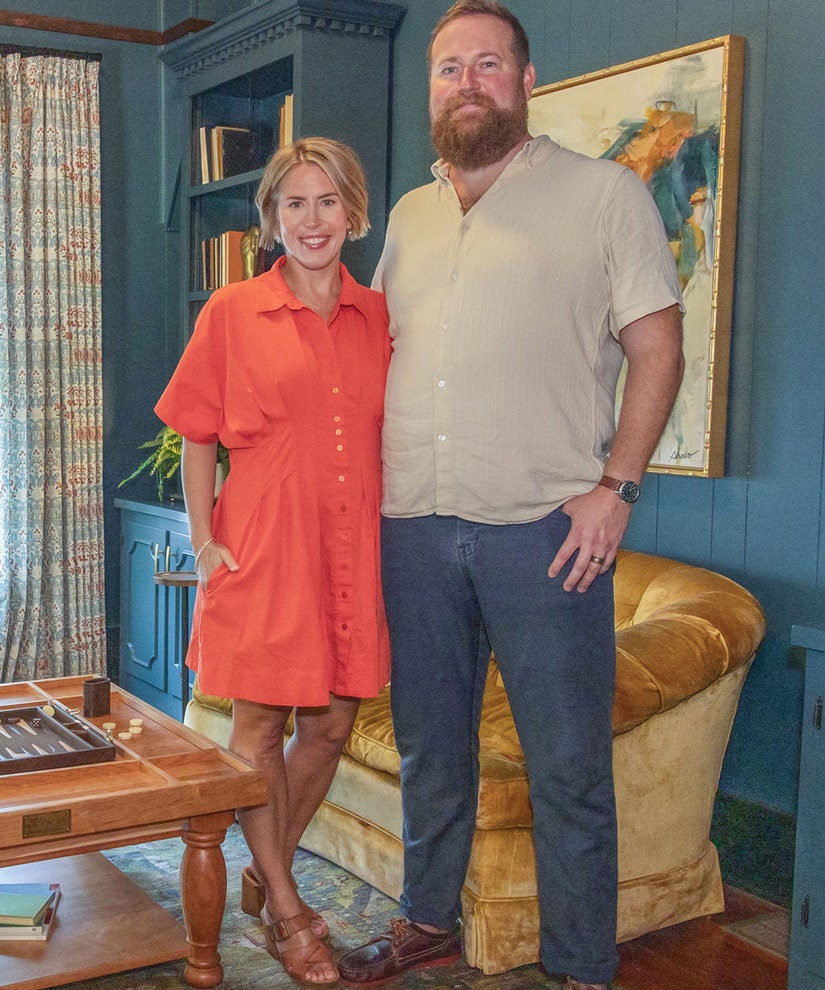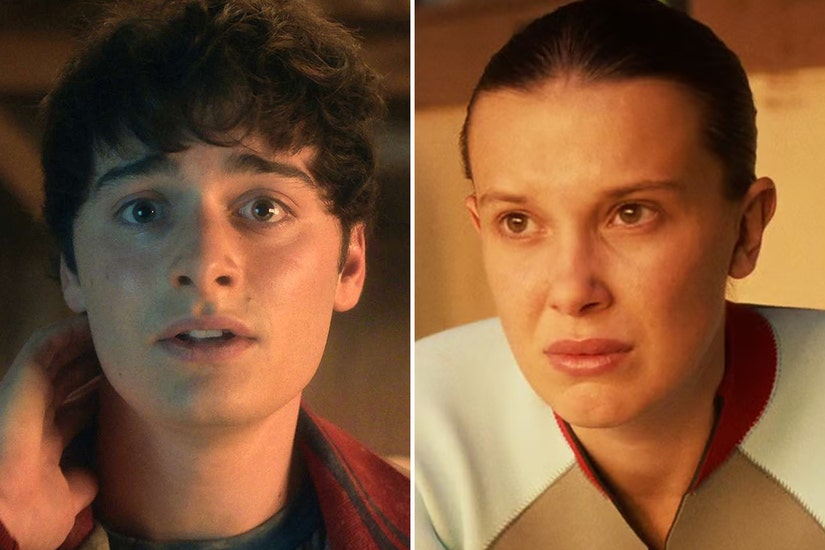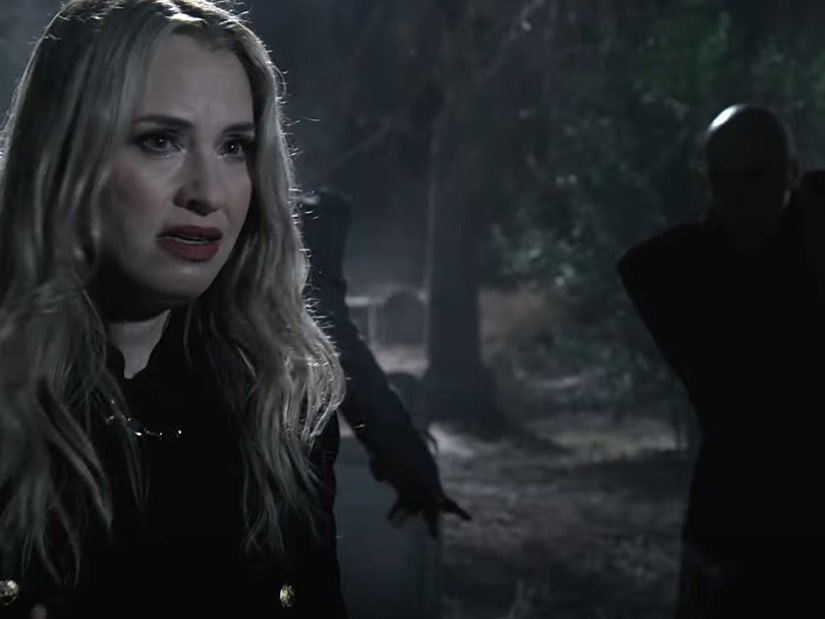 FX
FX
Part 1 of "American Horror Story: Double Feature" draws to a bloody close with a ... moral message?
After a great start, a cohesive story, a straightforward narrative and decent performances from most of our players, "American Horror Story: Double Feature" went predictably off the rails with its bloody "Red Tide" finale.
The first half of this season's two-story gimmick came to a screeching halt and it was as if we were suddenly dealing with a whole different story. Gone was the sinister and moody undertones of previous installments, and instead we get Alma delivering one of the worst groaners we could have imagined.
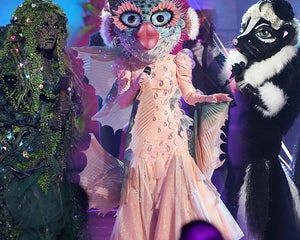 Fox
Fox
The Masked Singer Premiere Double Elimination Sends NBA Superstar Packing
View StoryThe humor was pushed heavily in the opening moments, with the Council of Provincetown mocking its own citizenry and ruthlessly shutting down petty requests like changing shingles or property easements. It's all a power trip, but it was handled cartoonishly.
There's always a bit of camp in horror, but this was the first season of "AHS" that didn't feel like it was leaning too far into that territory -- until now.
We got a little hopeful when "Glee" star Dot-Marie Jones showed up as a no-nonsense state trooper looking to investigate the brutal death of the town's sheriff, uncovered by a fisherman in the ocean, as well as her ongoing investigation into all the other P-Town murders.
You remember the sheriff? A character that was set up like she was going to do something only to do nothing but die at Alma's hands a few weeks ago? Sadly, as interesting as Jones was in this brief moment, where she vowed to get to the bottom of things after it was clear the haughty Council was hiding something, she clearly wasn't important to the story as a character; instead she was just a plot device.
We never saw her again. The same proved true for Doris. She was mentioned by her daughter, who is still happy that she's gone, but despite a random glimpse of someone around the house (another unresolved moment), she's just gone, apparently.
Lark made a couple of appearances to sharpen teeth and dress pale people, but apparently these writers couldn't be bothered to make her anything more than an extra in a show she was given opening credit billing in. Maybe they should consider a black pill.
At least we can speculate on some closure for Provincetown itself, though with a huge mess to clean up. And there was some heavy-handed closure for viewers as well, with Ryan Murphy and Brad Falchuk laying their allegory about talent and hard work and success on a little too thick.
Still, it wouldn't be "AHS" without plenty of WTF and this final "Red Tide" hour had plenty of those moments. We'll be pondering these all week as we await the premiere of "Death Valley" as "AHS" goes aliens and we speculate if these two chapters will connect at all -- maybe the black pills origin?
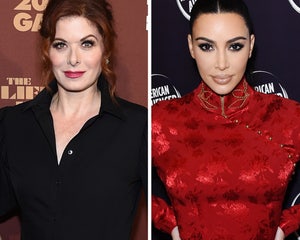 Getty
Getty
Debra Messing Asks 'Why Kim Kardashian?' After She's Named SNL Host
View StoryCouncil Abuses Its Citizenry
We talked about this above, but it was absolutely surreal having this episode open with the city council tearing into its own citizens over such petty things. They were all drunk with power, and none so bitchy as real estate agent Holden (Denis O'Hare).
His performance throughout has been a little campy, but he took that to the next level with this one scene. They were all so blatantly and openly corrupt, it was comical. It also pulled us right out of the well-established dark mood of the previous episodes that had us respecting that "AHS" was finally putting the horror front and center, rather than the absurd.
Dot-Marie Jones Is a Badass
The "Glee" alum did her part to add some gravity to the situation, and the biggest takeaway for us is to again recognize what an incredible performer she is, and wonder why Murphy and company haven't been using the hell out of her already on this show? She has such a commanding presence in any scene, and she's such a unique presence, you'd think Murphy would be throwing parts at her on this series.
Here's to hoping that this isn't the first and last time we see her on "AHS." In fact, she can become a regular part of the ensemble, so far as we're concerned. She did more in this one scene for us than Billie Lourd did in her (admittedly few) moments.
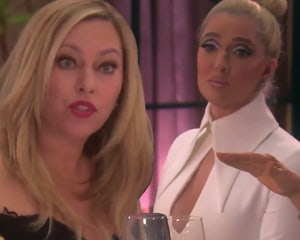 Bravo
Bravo
Erika Jayne Reacts To Tom's Conservatorship on RHOBH, Slams Family for Dementia Facility Plans
View StoryUrsula Confronts Pale People
Can we take a moment to set up this WTF moment with some background that again points out how deep into satire this episode was going. With state troopers nosing around, the Council threatened Belle (Frances Conroy) and Austin (Evan Peters) with stricter zoning ordinances if they didn't get this situation under control.
This was a serious threat delivered by Holden, and it appears to have been taken seriously. Is it that hard to come up with ways to end the show? Hell, we could have been satisfied with the ending of the last episode as it pretty much established where we were going anyway.
Back to the point, though, in response to the threat, Belle and Austin kidnapped Baby Eli in their attempt to lure Harry and Alma to their house so they could go ahead and kill them and be done with all the chaos. From there, Ursula came up with a master plan that proved she has the biggest balls on the whole show.
She's also a sociopath, opportunistic, Hollywood agent monster stereotype, but that doesn't take away from the badass moment she actually pitches to them the opportunity to kill the real enemy, those who've taken the pill and not turned pale.
It showed us that the pale people aren't as lost as we thought. The could be negotiated with, they understood what they lost, and they wanted a chance to get their lives back with her promise/lie of a new pill. That makes the absence of Doris even more tragic/stupid. Missed opportunity there.
Oh, and we love the metaphor Ursula used to convince them that they could still have a second chance, sharing the story of Laurence Fishburne's agent convincing him to turn down "Pulp Fiction" so he wouldn't have to work with has-been John Travolta, not knowing this would revive Travolta's career and become a classic.
Fishburne's second chance came when he beat out Samuel L. Jackson, ironically enough, for the role in "The Matrix," which was at least as big as "Pulp Fiction." One mistake doesn't have to define the rest of your career.
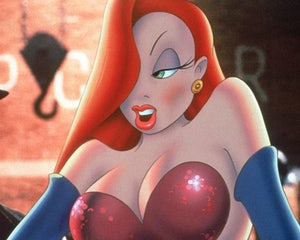 Everett Collection
Everett Collection
Jessica Rabbit Getting Makeover for Disneyland Ride, Fans Outraged
View StoryBelle Tries to Eat Baby Eli
Belle might think she's magical and special, but there's no way she could believe that Eli wouldn't feel a thing when she ripped him open and started drinking his blood. She doesn't have special powers, she just rips people open. That's gotta hurt!
The scene was also an opportunity for her to address the old stereotype that screenwriting isn't real writing, that Hollywood hacks aren't real artists. Of course, the black pills working on Harry means that's not true, but this must be a way to process all that insecurity.
Or maybe it's a way for Murphy and Falchuk to slap the notion in the face and try to prove that it's a ridiculous stereotype that has no basis in reality. It would have been a stronger argument if they'd have been able to make it in a better screenplay. But at least the message was so heavy-handed, we couldn't miss it.
Pale People Attack
We saw it coming a mile away, but after Belle and Austin loomed menacingly at the camera (Harry and Alma) like we were in a 3-D monster movie from the 1960s, it was still exciting to see the pale people burst through the windows and attack the erotic author and playwright.
With Harry and Alma next on the menu, this would have been another opportunity for a poignant and tragic reunion between them and Doris, who could have easily been one of the pale people in the house, before Ursula burst in the door and blew them all away.
She killed all the pale people, but apparently she and Alma had set up their next kill ahead of time. Otherwise, why didn't Ursula just take care of it in this moment?
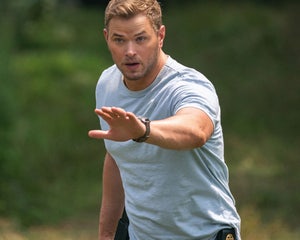 CBS
CBS
Why Kellan Lutz Is Leaving FBI: Most Wanted
View StoryAlma Rips Into Harry
Instead, in a seen set up so blatantly earlier in the episode we actually saw Alma looking knowingly into the camera, the little violinist told her father that only two of the family would be surviving this encounter before sinking her teeth into his neck.
Dismissing the fact he's far stronger than her and could have ripped her off of him in that instant (we'll assume she hit the artery and drained him in super-speed), we can't dismiss the cringeworthy line she delivered when the Chemist and Ursula decide to frame Harry for everything that happened in Provincetown.
The camera actually cut to Alma, bloody and still sucking Harry's neck. She turned to the women and said, "Do you mind? I don’t like people watching me while I eat." There was no reason for this. Why did they have to hurt us like that with such a godawful line. We thought we'd have nightmares about the pale people, but it might be this line and delivery.
On top of that, we were only about halfway through the episode at this point. That means this tacked-on coda that took the story to Hollywood was so important, the writers weren't worried about leaving P-Town's future uncertain, Doris forgotten, Dot-Marie Jones criminally underused
Chemist Cleaning Up Dirty Cops
Instead, we got to see the Chemist using her black pills to systematically and carefully target racist cops in Los Angeles, slip them black pills and set them up to get killed by their fellow cops. We have to give credit where it's due, it's pretty ingenious.
It's messy, sure, but we respect the consistency in her characterization to have a contained, controlled murderous situation once again in her new hometown. She's proof that there are people without black pills who are still very intelligent and worthy. Apparently, science and discipline are not talents, though.
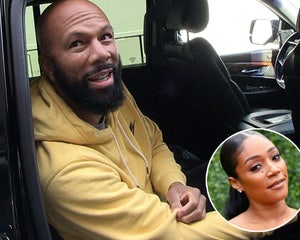 TooFab/Getty
TooFab/Getty
Common Responds to Tiffany Haddish's Request For A Deed Instead of a Ring (Exclusive)
View StoryAlma Claws Her Way to Top
Sadly, by this point in the show we'd pretty much lost all interest in Alma. We thought she'd be an interesting exploration of the darkness the black pills can pull out of you. After all, she's younger and doesn't have as developed a moral compass (or even brain, for that matter). Instead, she became a predictable cartoon caricature of evil.
So when we saw her auditioning for a part in an orchestra, we knew exactly where it was going to go. We do respect the authenticity of the other guy she was competing against telling her they'd never choose her because they're an orchestra, and she'd make them a novelty act at nine years old if she were the lead.
The message here is that the world isn't black-and-white, it isn't always fair. Sometimes being the best isn't enough because there are other factors to consider, nuances in real life. That's a concept that obviously would escape a caricature, which is why Alma preditably killed him.
How she was able to do so and have him die down the stairs and without getting any blood on her is a mystery. Did she lure him from the room? Gain superhuman strength? We also don't learn if there were any consequences for this murder, if she got the part or was still rejected? Apparently, those answers weren't interesting. Hearing the guy's speech to her about why being the best isn't enough was the point of this scene. In fact, we never see Alma again.
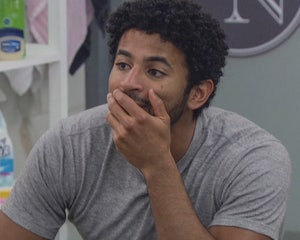 CBS
CBS
Big Brother Blowout: Veto Winner Determines Final Three -- Who Grabs All the Power?
View StoryUrsula Sowing Seeds of Mediocrity
Ursula's final scene is even more chaotic evil as she joins up with a screenwriting instructor to hawk the black pills to him and all of his students. Apparently, handing them out to anyone writing a screenplay at Starbucks wasn't enough.
But here's where we get a little confused. Ursula's motivation seemed to be making money and being the best agent in Hollywood. But with these moves, she is instead orchestrating total anarchy onto the streets. How is that beneficial to her? What does she gain from this?
Even her closing monologue, delivered over the cacophony of death on the streets as new pale people were slaughtering everyone, offered no clarity. Instead, it was another thinly-veiled statement about success.
Apparently, the pale people represent those people who are envious of the successful people out there, unaware that it takes actual hard work to achieve success, pushing through failure. As a metaphor it's a bit of a mess, but that went with the visuals.
 Getty/ABC
Getty/ABC
Vanessa Marcil Supports Ex Brian Austin Green on DWTS After Past Drama
View Story"Spit or Swallow"
Perhaps the more compelling metaphor, and we can't imagine it was a mistake, was when Ursula handed out all those pills in that screenwriting class and told the students that success is one swallow away. "Spit or swallow, the choice is yours."
This couldn't help but evoke #MeToo and all those decades that the casting couch dominated Hollywood. What price would you pay to have your dreams come true? How far would you go? What are you willing to do?
Harry made the comment that he wanted to try and get back her soul earlier in the hour, but Ursula told him it doesn't work that way. She also tried to argue that being without a conscience or moral compass is a good thing. It makes those choices easier to make -- and live with.
Certainly those seem to be personality traits that do very well in our cut-throat capitalist society, in Hollywood and beyond. So long as you believe as Alma does that the non-talented people don't really matter, then you can achieve all of your dreams. If you instead try to have a conscience or do the right thing, well you'll probably get devoured.
In the end, The Chemist appears to have abandoned both Ursula and Alma to their fates in Hollywood, heading off with Eli with the promise of a new city and a new pill. Will she keep Ursula and Alma supplied with black pills? Does she care? Do we? The story certainly doesn't. It's over.
"American Horror Story: Double Feature" continues next week with the premiere of Part 2, "Death Valley," Wednesday at 10 p.m. ET on FX.

